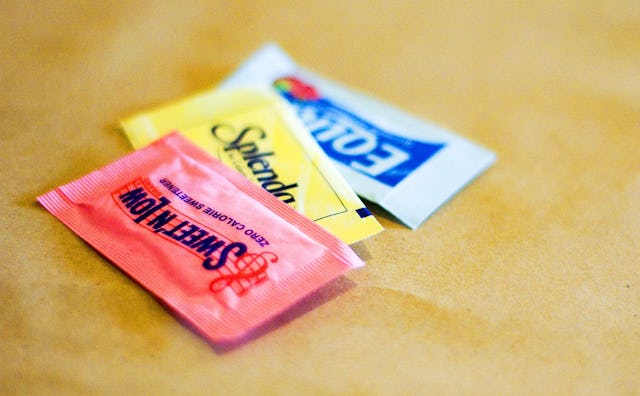Artificial Sweeteners Are Better For You Than Sugar, So Let’s All Have Diet Coke For Breakfast

The conventional wisdom has always been that artificial sweeteners are bad for you, that they cause cancer and brain tumors and turn to formaldehyde in your stomach. But an article in The New York Times yesterday takes on the alleged evil of sugar substitutes, declaring “[t]he available evidence points to the fact that there appears to be a correlation between sugar consumption and health problems; none can be detected with artificial sweeteners.”
For all my NutraSweet-devoted sisters and brothers, I raise a diet soda today and say congratulations, comrades. We no longer have to be ashamed of the little pink and blue and yellow packets we carry around in our purses, for the paper of record has all but commanded us to come out of the shadows and fulfill our closest-held dream: to add Crystal Light Raspberry Ice to the water supply.
In the ’80s there was a television commercial for Equal, a sugar substitute, the tagline for which was “Equal even tastes great straight!” I grew up in one of those healthy households where we didn’t have Chips Ahoy! or Franken Berry, but we did have Equal packets, a few of which, for a short period of time in fourth grade, I would consume as an after-school snack. Proving that sometimes there is indeed truth in advertising, Equal did taste great straight. It didn’t matter that it wasn’t sugar—it satisfied my craving for sweetness, unlike the Milk-Bone dog biscuits I had also tried in hopes that they’d taste like a delicious cookie.
I have been apologizing for my love of sugar substitute ever since. “Don’t judge me!” I’d cry as I dumped a Sweet’N Low in my iced tea. “Pretend you’re not seeing this,” I’d advise as I poured sugar-free Coffee-Mate in my coffee. “Breakfast of champions,” I’d toast as I popped open a Diet Coke at 9 a.m. And don’t get me started on my current paramour, Splenda, which tsk-tskers love to tell me is made from chlorine. I don’t fool myself that there’s anything natural about sugar substitutes, or that they jibe with the locally sourced, organically grown diet I try to espouse in most of the other things I consume. But as the Times article points out, artificial sweeteners “have, for decades, been attacked as harmful chemicals. But everything is a ‘chemical,’ and not all of them are bad for us.”
There was, I can’t help but guiltily recall, an article last fall on the Times website that reported that “[a]rtificial sweeteners may disrupt the body’s ability to regulate blood sugar, causing metabolic changes that can be a precursor to diabetes,” which was kind of depressing and made me reconsider for the millionth time my devotion to fake sweeteners. Today’s article doesn’t address the earlier one; it just points out that sugar consumption has been linked irrefutably with type 2 diabetes and overall weight, while none of the popular stains on artificial sweeteners’ name have been proven to be accurate.
For me, it’s never really been a health issue, but more a convenience one. Artificial sweetener is sweeter than sugar. It tends to dissolve better in cold beverages. And it doesn’t hurt that it lets me turn my coffee into something resembling coffee ice cream without worrying that I’m indulging in dessert before 7 a.m. And for all those looking down their noses and telling me my beloved packets of lab experiments “taste artificial,” I consider myself blessed that I can’t really tell the difference. In fact, as it’s become more common for cafes to put out simple syrup (sugar dissolved in water) for easy dissolution in iced coffee, I still go for the Splenda. I think I just like it better.
Blame it on my early secret Equal addiction, blame it on a fear of the Cavity Creeps or just a weird preference for something most healthy adults have deemed kind of disgusting, but I love sucralose. I love aspartame and saccharin, and I don’t really love stevia but it gets lumped in with my sweet treasures, so I’ll include it—it’s a big tent. And today’s good news that it’s preferable, health-wise, to sugar, is a small victory for lovers of calorie-free soft drinks everywhere. How sweet it really, truly, scientifically, irrefutably is.
This article was originally published on